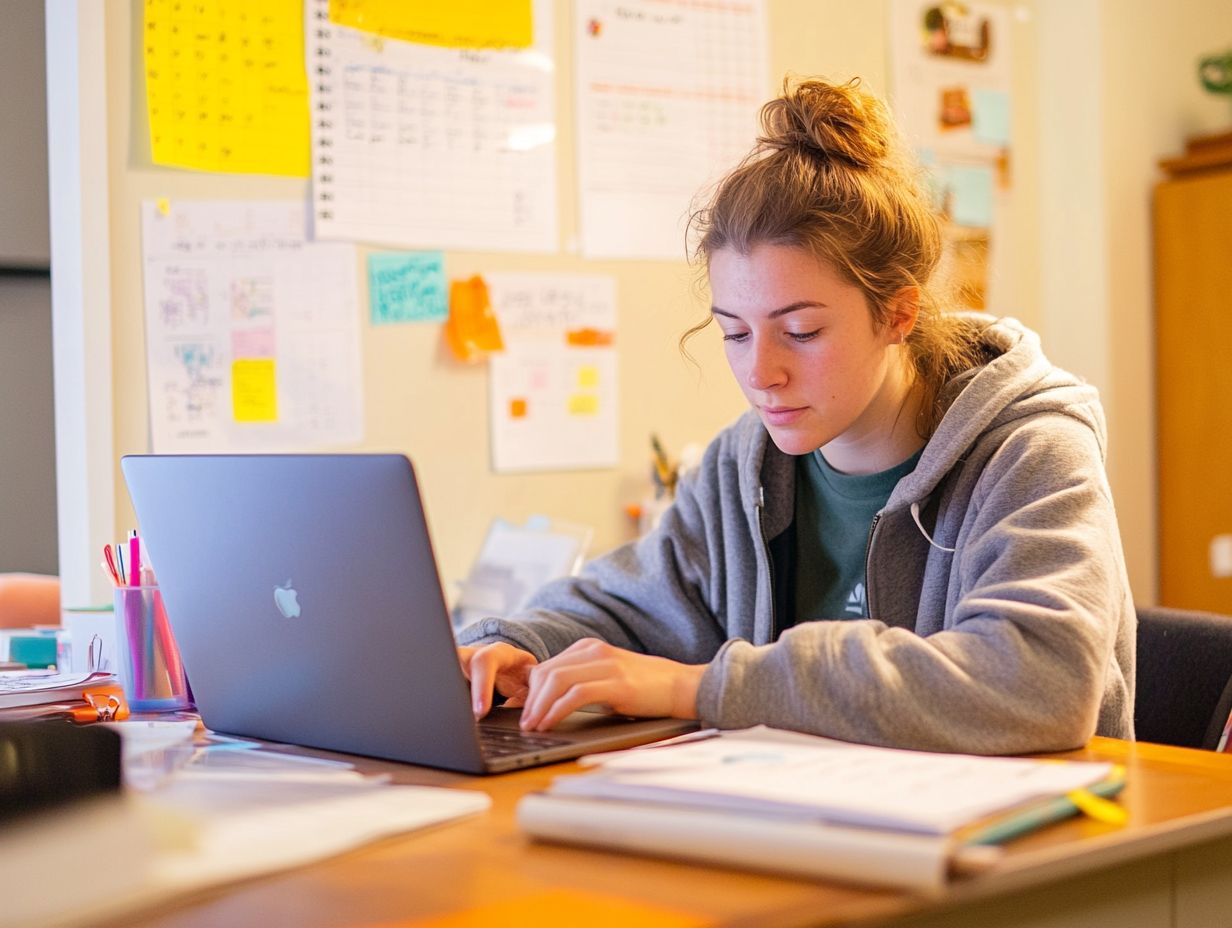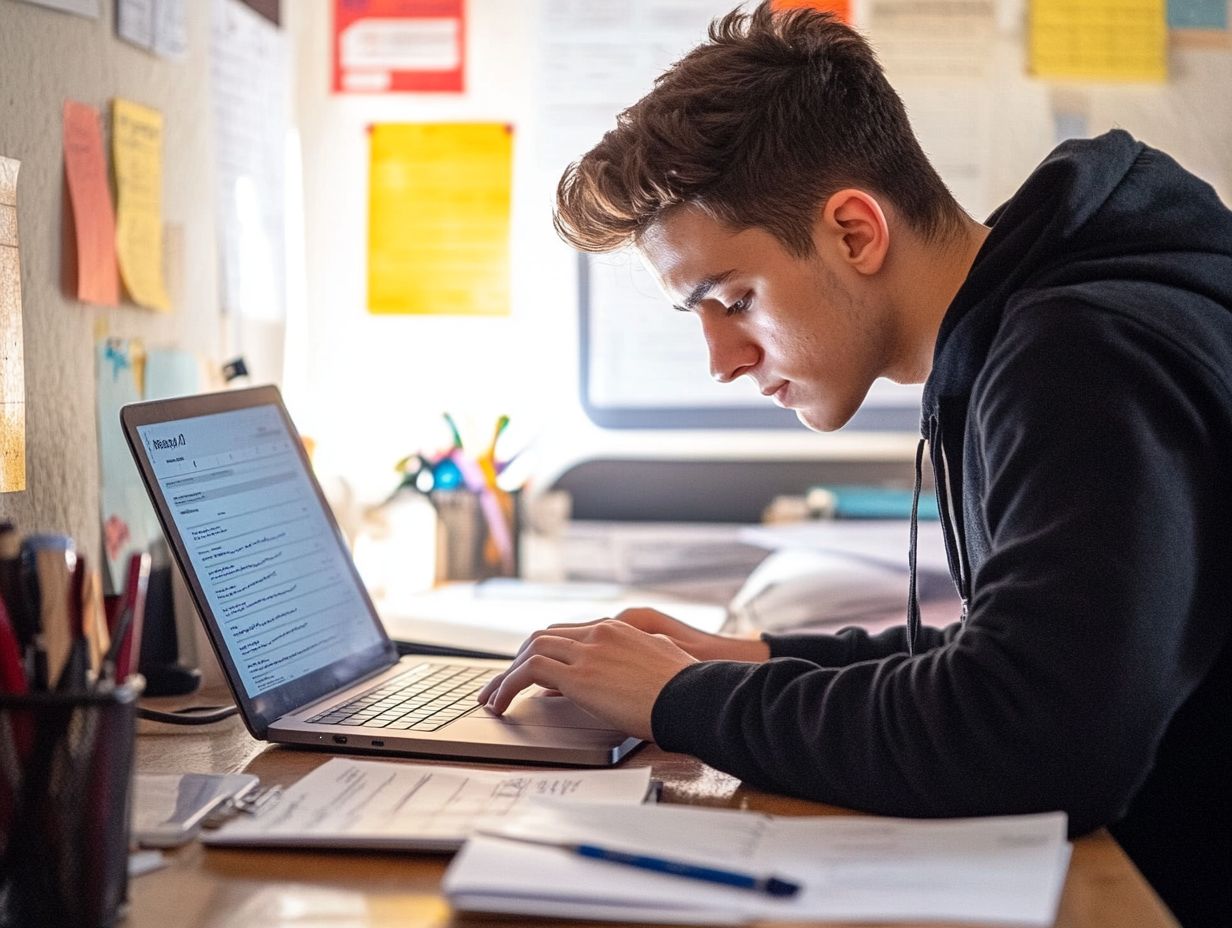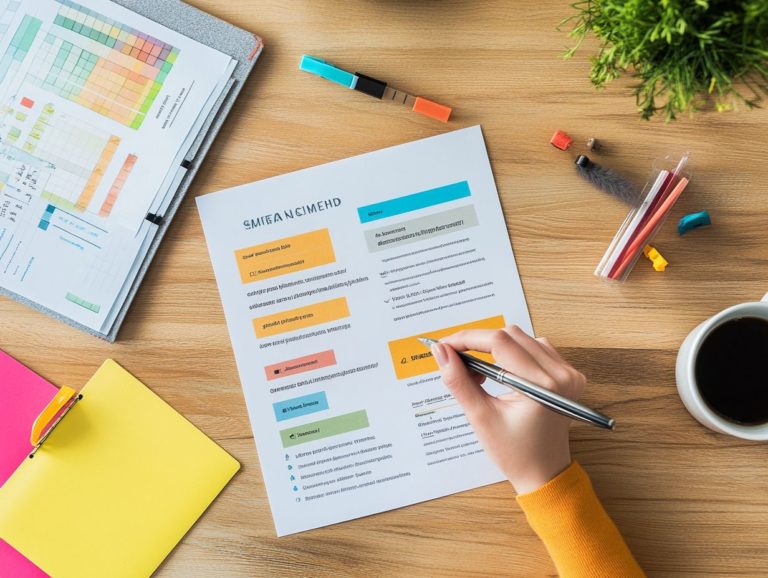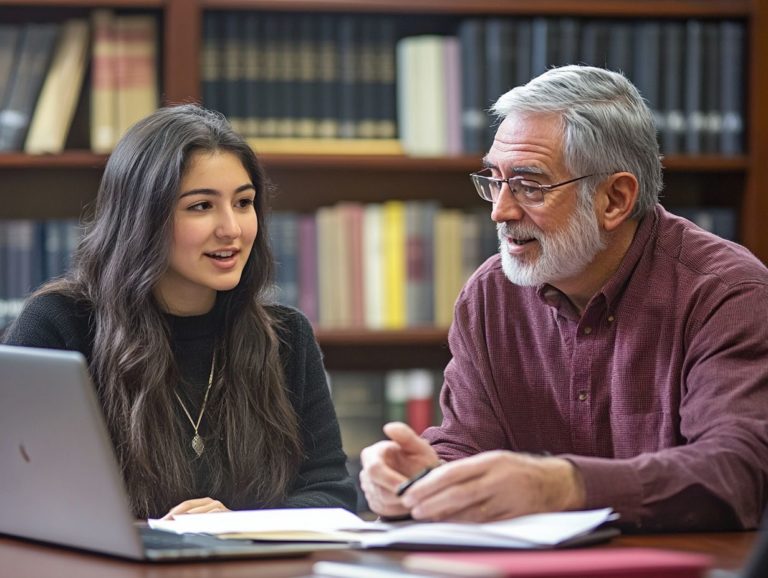How to Prepare for On-Campus Interviews
On-campus interviews can serve as a crucial milestone in your career journey, providing a distinctive opportunity to engage directly with potential employers.
This article delves into the intricacies of on-campus interviews, highlighting their myriad benefits and how they can significantly elevate your job search.
Essential preparation tips include thorough research on companies and refining your resume. Learn what to bring, effective interview strategies, and the critical role of follow-up.
Are you ready to make an impression that lasts? Let s dive in!
Contents
- Key Takeaways:
- Benefits of On-Campus Interviews
- Preparing for On-Campus Interviews
- What to Bring to an On-Campus Interview
- During the Interview
- Following Up After the Interview
- Frequently Asked Questions
- What are the benefits of preparing for on-campus interviews?
- How far in advance should I start preparing for on-campus interviews?
- What are some tips for researching the company before an on-campus interview?
- How can I practice my interview skills for on-campus interviews?
- What should I bring to an on-campus interview?
- How should I follow up after an on-campus interview?
Key Takeaways:

- Participating in on-campus interviews opens doors to job opportunities and networking.
- Effective preparation increases your success rate by researching the company, polishing your resume, and practicing answers.
- Bring essential items to your interview and send thank you notes afterward to leave a positive impression.
What are On-Campus Interviews?
On-campus interviews are an essential part of your academic job search, allowing you to showcase your qualifications directly to the group of people evaluating your application and faculty members.
During this process, you ll be invited to present your job talk, which typically includes a research presentation and often a teaching demonstration. This is your moment to provide insight into how well you might fit within the department and the broader university culture.
These interviews are pivotal for higher education institutions as they seek to identify promising scholars for permanent faculty roles. Throughout your visit, you ll engage in various interactions, from roundtable discussions with faculty to informal lunches and sometimes meetings with students.
This multifaceted format allows the committee not only to evaluate your technical skills and knowledge but also to assess your interpersonal abilities and how well you mesh with the existing academic community.
These comprehensive evaluations are crucial in ensuring that selected individuals will contribute positively to the university’s intellectual environment and overall mission.
Benefits of On-Campus Interviews
Engaging in on-campus interviews presents a wealth of advantages for both candidates and universities, greatly enriching the academic job search experience.
For you, these interviews represent a crucial opportunity to highlight your qualifications, research interests, and teaching philosophy. They also let you gain valuable insights into the campus culture and the specific needs of students, setting the stage for well-considered choices.
Why Participate in On-Campus Interviews?
Participating in on-campus interviews is essential if you re aiming for a tenure-track position. It s an invaluable opportunity to elevate your personal brand and clearly communicate your vision and qualifications.
These interviews not only allow you to connect with alumni insights but also help you hone your communication skills, which are crucial for leaving a lasting impression during your academic job search.
In this setting, you can showcase your research and teaching capabilities directly to decision-makers, giving you the chance to articulate your scholarship and pedagogical approach effectively.
Consider attending job search workshops to refine your presentation skills and gather strategies for navigating the often complex interview processes.
Engaging with alumni can provide tailored insights and practical advice that will enrich your preparedness and boost your confidence.
By emphasizing your unique contributions and aligning them with the department’s goals, you can significantly enhance your chances of success, demonstrating not just your competence but also your cultural fit within the academic community.
Preparing for On-Campus Interviews
Preparing for on-campus interviews is a crucial step in your academic job search that demands strategic planning and meticulous preparation.
You must carefully organize your application materials and distill your research experience into a compelling narrative.
This way, you can present an effective communication strategy that truly resonates with the search committee.
Get started on your preparation today to stand out in your next interview!
Researching the Company and Position

Researching the university and the specific position is crucial for your success in preparing for on-campus interviews! It helps you showcase how perfectly your skills fit the role by aligning your skills and experiences with the job responsibilities outlined on the university website.
By diving deep into the institution’s values, faculty members, and student needs, you can effectively tailor your presentation. Understanding the university’s mission gives you insight into the culture and priorities that shape the campus environment, helping you demonstrate your compatibility.
Exploring the department s faculty helps you learn about ongoing research projects and teaching styles, revealing how your expertise can complement their existing strengths. Being aware of student expectations enables you to discuss innovative teaching methods, engagement strategies, and ways to help students succeed that resonate with both current students and the administration.
This level of preparation not only sets you apart in interviews but also positions you as an ideal contributor to the university’s academic community.
Polishing Your Resume and Cover Letter
Polishing your resume and cover letter is essential when preparing for on-campus interviews; these documents are your first chance to make a strong impression on the search committee and faculty members. A well-crafted resume showcases your relevant research experience and teaching demonstrations, while a compelling cover letter conveys your passion and suitability for the position.
To truly capture the committee s attention, tailor both documents to highlight your unique qualifications and strengths. Use clear, concise language to express your ideas clearly, including examples of successful interactions with students.
Be sure to include a section dedicated to your research contributions, especially those that align with the institution’s focus areas. This not only underscores your expertise but also your potential to enrich the academic community.
Creating a lasting positive impression with these materials is crucial, as they lay the groundwork for your future conversations.
Practicing Interview Questions
Practicing interview questions is a vital part of your preparation for on-campus interviews, as it enables you to express your ideas clearly with both confidence and clarity. Engaging in mock interviews can significantly enhance your communication skills, equipping you to handle thoughtful queries and follow-up questions that may arise during the interview process.
To further bolster your readiness, consider compiling a comprehensive list of common interview questions relevant to your field. This proactive strategy allows you to identify key themes and expectations from the search committee, ensuring that your answers are tailored and impactful.
Practicing with mentors or peers in a simulated environment can yield constructive feedback and elevate your overall poise. By emphasizing clarity and thoughtfulness in your responses, you not only showcase your qualifications but also demonstrate an understanding of the nuances of effective dialogue, ultimately improving your chances of making a lasting impression.
What to Bring to an On-Campus Interview
When preparing for on-campus interviews, it s essential to know exactly what to bring to ensure a smooth and successful experience. You should pack key items, including:
- Your application materials
- A portfolio that highlights your research
- Some snacks to keep your energy levels up throughout the day
Essential Items to Bring
- Well-organized portfolio
- Research presentation materials
- Documentation for teaching demonstrations
These important items contribute to creating a positive impression on the search committee. Make sure your materials are organized and easily accessible during the interview process.
Your professional attire speaks volumes about your competence and confidence. A polished appearance reflects your seriousness about the position and helps establish rapport with the interviewers.
Providing research presentation slides that are clearly designed ensures effective communication of complex ideas. Providing handouts for teaching demonstrations offers a tangible reference for the committee.
Together, these elements highlight your qualifications and demonstrate your commitment to engaging with and contributing to the academic community.
During the Interview

During the interview, your effective communication skills are paramount. You ll need to navigate various components, including your job talk, question-and-answer sessions, and interactions with faculty members.
This phase is critical for establishing rapport and making a lasting impression on the search committee, who are diligently assessing your fit for the position.
Tips for a Successful Interview
To ensure a successful on-campus interview, focus on sharpening your communication skills, dressing professionally, and showcasing your personality throughout the process. Additionally, knowing how to prepare for an internship interview can provide valuable insights into your fit within the department and help you connect with faculty members.
Selecting the right attire is crucial; aim for business professional clothing that aligns with the institution’s culture while keeping comfort in mind. Your body language can convey volumes about your confidence and enthusiasm. Maintaining eye contact, offering a firm handshake, and sitting up straight signals genuine interest and professionalism.
Personal anecdotes can serve as effective conversation starters. Sharing relevant experiences allows you to highlight your unique qualities while making yourself more relatable. By combining these strategies, you enhance your chances of leaving a lasting impression during the interview.
Following Up After the Interview
Don’t delay in reaching out it’s your chance to stand out! Following up after your on-campus interviews is an essential step in the academic job search process. It showcases your professionalism and reinforces your interest in the position.
Send personalized thank-you notes to reiterate key points discussed during your interview and clarify the next steps. This helps maintain open communication with the search committee and leaves a lasting impression.
Thank You Notes and Next Steps
Crafting thoughtful thank-you notes after your on-campus interviews is essential for reinforcing a positive impression and maintaining rapport with the committee. In these notes, express genuine appreciation, highlight key discussion points, and inquire about any follow-up questions.
Keep your tone professional, but make it feel friendly and relatable. Structure your message clearly begin with gratitude, follow with specific mentions of the interview discussion, and conclude with enthusiasm for the opportunity.
A brief reminder of how your skills align with the department s goals can solidify your fit for the position. Addressing potential follow-up inquiries demonstrates your awareness and eagerness to engage further, ultimately strengthening your connection with the committee.
Frequently Asked Questions
Please refer to the upcoming section for common queries related to on-campus interviews.
What are the benefits of preparing for on-campus interviews?

Preparing for on-campus interviews gives you a competitive edge over other candidates and boosts your chances of getting hired. It also helps you feel more confident during the interview process.
How far in advance should I start preparing for on-campus interviews?
Start preparing at least one to two weeks in advance. This timeframe provides enough time to research the company, practice your interview skills, and perfect your resume and cover letter.
What are some tips for researching the company before an on-campus interview?
Begin by visiting the company’s website to learn about their mission, values, and recent news. Connect with current or former employees on LinkedIn to gain insight into the company culture and values.
How can I practice my interview skills for on-campus interviews?
You can practice with friends or family through practice interviews or use online resources such as interview question databases. Additionally, schedule a mock interview with your career center for personalized feedback. A mock interview is a practice session that simulates a real interview experience.
What should I bring to an on-campus interview?
Don’t forget to bring multiple copies of your resume, a pen, and a notepad for taking notes. Also, include any relevant documents such as a portfolio or letters of recommendation. Consider bringing a professional folder or portfolio to keep your documents organized.
How should I follow up after an on-campus interview?
Make sure to send your thank-you email or note within 24 hours of the interview. This shows your appreciation for the opportunity and allows you to reiterate your interest in the position. You can also request the interviewer’s contact information to follow up if you haven’t heard back.






